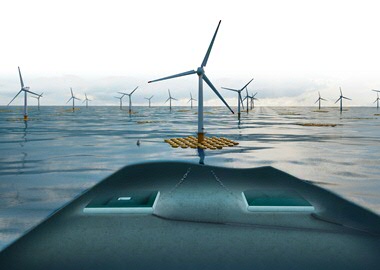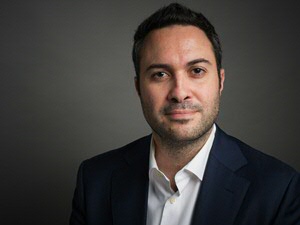Vakis and Jayawardhana (Ocean Grazer) nominated for Huibregtsen Prize

Antonis Vakis and Bayu Jayawardhana have been nominated for the 2021 Huibregtsen Prize for their research project ‘Harvesting infinite wave energy with the Ocean Grazer’.
From 31 proposals, the jury selected just six research projects for the Huibregtsen Prize. On 4 October 2021, the chair of the jury, President of the Royal Netherlands Academy of Arts and Sciences (KNAW) Ineke Sluiter, will announce the winner during the Night of Science & Society (Avond van Wetenschap & Maatschappij) in the Nieuwe Kerk in The Hague.

The Ocean Grazer
The Ocean Grazer harvests renewable energy from sea waves and integrates this with a modular solution for the large-scale storage of electricity that is generated by wind turbines and floating solar panels at sea. As a result, clean energy can be generated under all weather conditions. The mechanism is based on technology from a hydroelectric plant, technology that has been proven to be highly reliable and efficient for over a century. The Ocean Grazer was developed by the company of the same name, which will soon present the first prototype in the Eemshaven seaport. The spiritual father of the Ocean Grazer is Wout Prins.
The Ocean Grazer was also the winner of the first UG Ben Feringa Impact Award, in November 2020.
Jury report
From the jury report: Antonis Vakis and Bayu Jayawardhana have succeeded in converting the endless sea swell into a limitless source of energy. They are leading a multidisciplinary team in which experts from the fields of electrical engineering to environmental law work together to design, simulate, validate and realize an energy revolution. They have shown that their scientific models are practically feasible. Recently, the first proof of concept of the Ocean Grazer, commissioned by Groningen Seaports, was successfully developed in the Eemshaven. It is commendable that the generation of renewable ocean energy will not be using up extra space because the Ocean Grazer can be integrated into wind farms at sea.
One of the innovations of the Ocean Grazer is that it generates energy from all waves, no matter their height. (...) Another innovation is that the Ocean Grazer absorbs this wave energy bit by bit as the wave rolls through it. This way the Ocean Grazer functions much more efficiently than other wave energy systems. The jury values it greatly that Vakis and Jayawardhana have been actively involved with the energy transition agenda. That there is so much interest among students to perform research projects with the Ocean Grazer is a beautiful recognition of their innovative and socially relevant work.

The Huibregtsen Prize
The Huibregtsen Prize was established in 2005 by the board of the Stichting De Avond van Wetenschap & Maatschappij (Night of Science & Society Foundation), in honour of Wouter Huibregtsen. The prize is awarded to a research project that breaks new scientific ground and is societally relevant. In 2021, the jury comprises: Ineke Sluiter, President of KNAW (chair); Pearl Dykstra, Professor of Empirical Sociology at Erasmus University Rotterdam; Philip Scheltens, Professor of Neurology and Director of the Alzheimer’s Center at VU medical center; Ionica Smeets, Professor of Science Communication at Leiden University; Elly Konijn, Professor of Media Psychology Vrije Universiteit Amsterdam; Johan Hoorn, Professor of Social Robotics Hong Kong Polytechnic University; Coen Verbraak, journalist and documentary filmmaker.
The Prize is awarded during the Night of Science & Society. The Prize comprises a sculpture, ‘De Denker’ (The Thinker) by Wil van der Laan, the sum of €25,000 and a workshop, offered by the Lorentz Center in Leiden.
More information
- Antonis Vakis
- Bayu Jayawardhana
- Short video on the Ocean Grazer below
| Last modified: | 19 January 2023 10.16 a.m. |
More news
-
03 April 2025
IMChip and MimeCure in top 10 of the national Academic Startup Competition
Prof. Tamalika Banerjee’s startup IMChip and Prof. Erik Frijlink and Dr. Luke van der Koog’s startup MimeCure have made it into the top 10 of the national Academic Startup Competition.
-
01 April 2025
NSC’s electoral reform plan may have unwanted consequences
The new voting system, proposed by minister Uitermark, could jeopardize the fundamental principle of proportional representation, says Davide Grossi, Professor of Collective Decision Making and Computation at the University of Groningen
-
01 April 2025
'Diversity leads to better science'
In addition to her biological research on ageing, Hannah Dugdale also studies disparities relating to diversity in science. Thanks to the latter, she is one of the two 2024 laureates of the Athena Award, an NWO prize for successful and inspiring...
